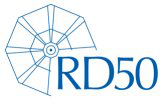Speaker
Description
In this work the Thermally Stimulated Techniques including TS-Current (TSC) and TS-Capacitance (TS-Cap) has been used to study the properties of the radiation induced BiOi defect complex by 6 MeV electrons. Two different types of diodes manufactured on p-types epitaxial-(EPI) and czochralski-CZ silicon with a resistivity of about 10 Wcm were irradiated with fluence values in the range between 1 x 1015 cm-2 and 6 x 1015 cm-2. In order to evaluate the parameter of BiOi defect (activation energy, capture cross section, concentration) from the TSC and TS-Cap measurements the well known electric field enhance emission effect (Poole Frenkel effect) in 3D version had to be considered and was included in the simulation software. The changes of the position dependent electric field strength, the effective doping profile as well as the occupation of the defect during the BiOi emission were simulated as function of temperature in the relevant range. In addition, the macroscopic properties (dark current and effective doping concentration) were extracted from current-voltage (I-V) and capacitance-voltage (C-V) measurements at 20oC for the EPI- and Cz-diodes. Furthermore, isothermal annealing studies at 80oC for annealing times between 0 min and 120 min had been performed. The results will be presented and discussed.
